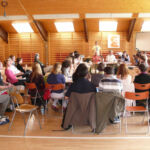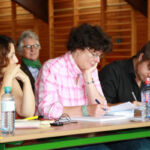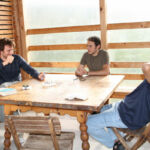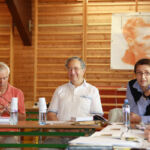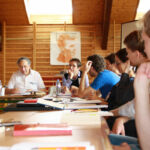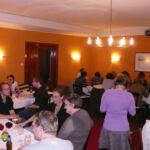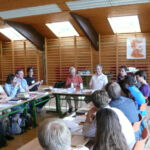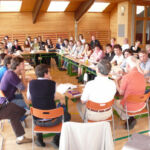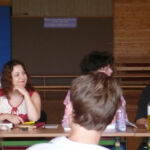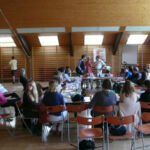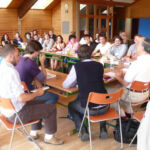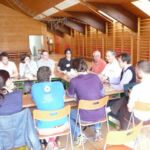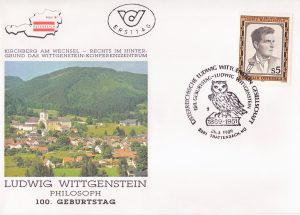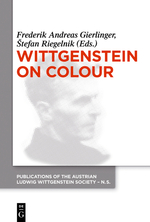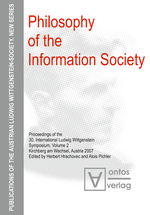‘1st’ International Wittgenstein Symposium: 24–25 April 1976
Wittgenstein Tage
Wissenschaftliche Leitung: Elisabeth Leinfellner, Werner Leinfellner, Rudolf Haller,Paul Weingartner, Adolf Hübner
2nd IWS: 29 August–4 September 1977
Wittgenstein und sein Einfluss auf die gegenwärtige Philosophie
Wittgenstein and His Impact on Contemporary Thought
Wissenschaftliche Leitung: Elisabeth Leinfellner, Werner Leinfellner, Hal Berghel, Adolf Hübner
3rd IWS: 13–19 August 1978
Wittgenstein, der Wiener Kreis und der Kritische Rationalismus
Wittgenstein, the Vienna Circle, and Critical Rationalism (including a seminar on Popper’s “open society)
Wissenschaftliche Leitung: Hal Berghel, Adolf Hübner, Eckehart Köhler
4th IWS: 27 August–2 September 1979
Sprache, Logik und Philosophie
Language, Logic, and Philosophy
Wissenschaftliche Leitung: Rudolf Haller, Wolfgang Grassl
5th IWS: 25–31 August 1980
Ethik. Grundlagen, Probleme und Anwendungen
Ethics: Foundations, Problems, and Applications
Wissenschaftliche Leitung: Edgar Morscher, Rudolf Stranzinger
6th IWS: 23–30 August 1981
Sprache und Ontologie
Language and Ontology
Wissenschaftliche Leitung: Werner Leinfellner, Eric Kraemer, Jeffrey Schank
7th IWS: 22–29 August 1982
Erkenntnis- und Wissenschaftstheorie
Epistemology and Philosophy of Science
Wissenschaftliche Leitung: Paul Weingartner, Johannes Czermak
8th IWS: 15–21 August 1983
Ästhetik — Religionsphilosophie
Aesthetics – Philosophy of Religion
Wissenschaftliche Leitung: Wolfgang L. Gombocz, Rudolf Haller
9th IWS: 19–26 August 1984
Philosophie des Geistes — Philosophie der Psychologie
Philosophy of Mind — Philosophy of Psychology
Wissenschaftliche Leitung: Roderick M. Chisholm, Johann Christian Marek, John T. Blackmore, Adolf Hübner
10th IWS: 18–25 August 1985.
Die Aufgaben der Philosophie in der Gegenwart
The Tasks of Contemporary Philosophy (including a seminar on Austrian Philosophy)
Wissenschaftliche Leitung: Werner Leinfellner, Franz M. Wuketits
11th IWS: 4–13 August 1986
Logik, Wissenschaftstheorie und Erkenntnistheorie
Recent Developments in Epistemology and Philosophy of Science (including a seminar “Digital Intelligence: From Philosophy to Technology” on Kurt Gödel)
Wissenschaftliche Leitung: Paul Weingartner, Gerhard Schurz
12th IWS: 7–14 August 1987
Philosophie des Rechts, der Politik und der Gesellschaft
Philosophy of Law, Politics, and Society (including a seminar on editing Wittgenstein)
Wissenschaftliche Leitung: Ota Weinberger, Peter Koller, Alfred Schramm
13th IWS: 14–21 August 1988
Philosophie der Naturwissenschaften
Philosophy of the Natural Sciences (including a seminar on Joachim Jungius and ‘practical logic’)
Wissenschaftliche Leitung: Paul Weingartner, Gerhard Schurz
14th IWS: 13–20 August 1989
Wittgenstein. Eine Neubewertung
Ludwig Wittgenstein: A Re-evaluation
Wissenschaftliche Leitung: Rudolf Haller, Johannes Brandl
15th IWS: 16–23 August 1992
Philosophie der Mathematik
Philosophy of Mathematics
Wissenschaftliche Leitung: Johannes Czermak, Klaus Puhl
16th IWS: 15–22 August 1993
Philosophie und die kognitiven Wissenschaften
Philosophy and the Cognitive Sciences
Wissenschaftliche Leitung: Roberto Casati, Barry Smith, Graham White
17th IWS: 14–21 August 1994
Die britische Tradition in der Philosophie des 20. Jahrhunderts
The British Tradition in 20th Century Philosophy
Wissenschaftliche Leitung: Jaakko Hintikka, Klaus Puhl
18th IWS: 13–20 August 1995
Wittgenstein und die Kulturphilosophie
Wittgenstein and the Philosophy of Culture
Wissenschaftliche Leitung: Kjell S. Johannessen, Tore Nordenstam
19th IWS: 11–18 August 1996
Aktuelle Probleme der politischen Philosophie
Current Issues in Political Philosophy: Justice and Welfare in Society and World Order
Wissenschaftliche Leitung: Peter Koller, Klaus Puhl
20th IWS: 10–16 August 1997
Die Rolle der Pragmatik in der Gegenwartsphilosophie
The Role of Pragmatics in Contemporary Philosophy
Wissenschaftliche Leitung: Paul Weingartner, Gerhard Schurz, Georg Dorn
21st IWS: 16–22 August 1998
Angewandte Ethik
Applied Ethics
Wissenschaftliche Leitung: Peter Kampits, Karoly Kokai, Anja Weiberg
22nd IWS: 15–21 August 1999
Metaphysik im postmetaphysischen Zeitalter
Metaphysics in the Post-Metaphysical Age
Wissenschaftliche Leitung: Uwe Meixner, Peter Simons
23rd IWS: 13–19 August 2000
Rationalität und Irrationalität
Rationality and Irrationality
Wissenschaftliche Leitung: Berit Brogaard, Barry Smith
24th IWS: 12–18 August 2001
Wittgenstein und die Zukunft der Philosophie. Eine Neubewertung nach 50 Jahren
Wittgenstein and the Future Philosophy – A Reassessment after 50 Years
Wissenschaftliche Leitung: Rudolf Haller, Klaus Puhl
25th IWS: 11–17 August 2002
Personen. Ein Interdisziplinärer Dialog
Persons – An Interdisciplinary Approach
Wissenschaftliche Leitung: Christian Kanzian, Josef Quitterer, Edmund Runggaldier
26th IWS: 3–9 August 2003
Wissen und Glauben
Knowledge and Belief
Wissenschaftliche Leitung: Winfried Löffler, Paul Weingartner
27th IWS: 8–14 August 2004
Erfahrung und Analyse
Experience and Analysis
Wissenschaftliche Leitung: Johann Christian Marek, Maria Elisabeth Reicher
28th IWS: 7–13 August 2005
Zeit und Geschichte
Time and History
Wissenschaftliche Leitung: Friedrich Stadler, Michael Stöltzner
29th IWS: 6–12 August 2006
Kulturen: Streit — Analyse — Dialog
Cultures: Conflict – Analysis – Dialog
Wissenschaftliche Leitung: Georg Gasser, Christian Kanzian, Edmund Runggaldier
30th IWS: 5–11 August 2007
Philosophie der Informationsgesellschaft
Philosophy of the Information Society
Wissenschaftliche Leitung: Alois Pichler, Herbert Hrachovec
31st IWS: 10–16 August 2008
Reduktion und Elimination in Philosophie und den Wissenschaften
Reduction and Elimination in Philosophy and the Sciences
Wissenschaftliche Leitung: Alexander Hieke, Hannes Leitgeb
32nd IWS: 9–15 August 2009
Sprache und Welt
Language and World
Wissenschaftliche Leitung: Volker A. Munz, Klaus Puhl, Joseph Wang
33rd IWS: 8–14 August 2010
Bild und Bildlichkeit in Philosophie, Wissenschaft und Kunst
Image and Imaging in Philosophy, Science, and the Arts
Wissenschaftliche Leitung: Richard Heinrich, Elisabeth Nemeth, Wolfram Pichler
34th IWS: 7–13 August 2011
Erkenntnistheorie: Kontexte, Werte, Dissens
Epistemology: Contexts, Values, Disagreement
Wissenschaftliche Leitung: Christoph Jäger, Winfried Löffler
35th IWS: 5–11 August 2012
Ethik – Gesellschaft – Politik
Ethics – Society – Politics
Wissenschaftliche Leitung: Martin G. Weiss, Hajo Greif
36th IWS: 11–17 August 2013
Geist, Sprache und Handlung
Mind, Language and Action
Wissenschaftliche Leitung: Danièle Moyal-Sharrock, Annalisa Coliva, Volker A. Munz
37th IWS: 10–16 August 2014
Analytische und Kontinentale Philosophie: Perspektiven und Methoden
Analytical and Continental Philosophy: Methods and Perspectives
Wissenschaftliche Leitung: Sonja Rinofner-Kreidl, Harald A. Wiltsche
38th IWS: 9–15 of August 2015
Realismus – Relativismus – Konstruktivismus
Realism – Relativism – Constructivism
Wissenschaftliche Leitung: Christian Kanzian, Josef Mitterer, Katharina Neges
39th IWS: 7–13 of August 2016
Ästhetik heute: Zeitgenössische Zugänge zur Ästhetik der Natur und der Künste
Aesthetics Today: Contemporary Approaches to the Aesthetics of Nature and of Art
Wissenschaftliche Leitung: Stefan Majetschak, Anja Weiberg
40th IWS: 6–12 of August 2017
Die Philosophie der Wahrnehmung und der Beobachtung
The Philosophy of Perception and Observation
Wissenschaftliche Leitung: Christoph Limbeck-Lilienau, Friedrich Stadler (Vienna)
Friedrich Stadler / Sascha Windholz
40x Internationales Wittgenstein Symposium
Sonderband der Beiträge der Österreichische Ludwig Wittgenstein Gesellschaft
Zum 40. Internationalen Wittgenstein Symposium, Kirchberg am Wechsel 2017

